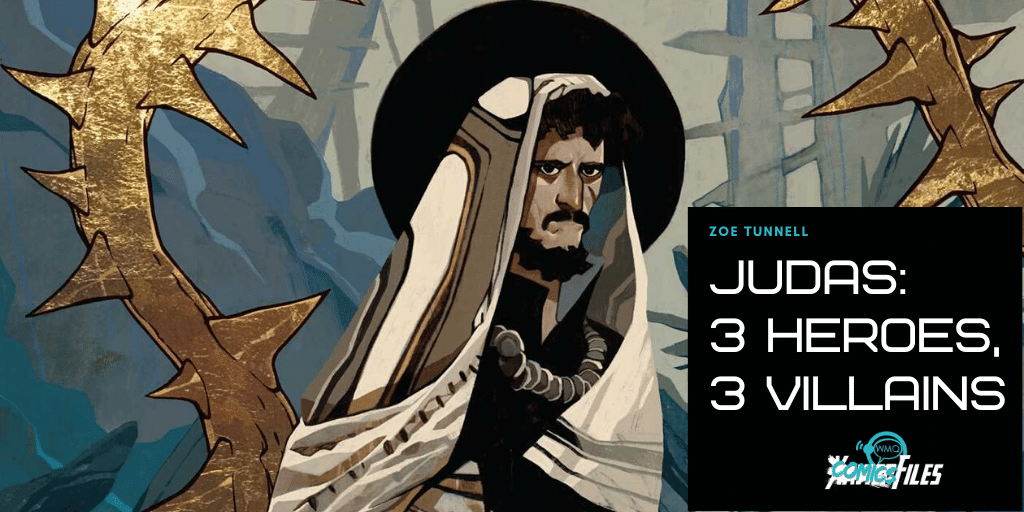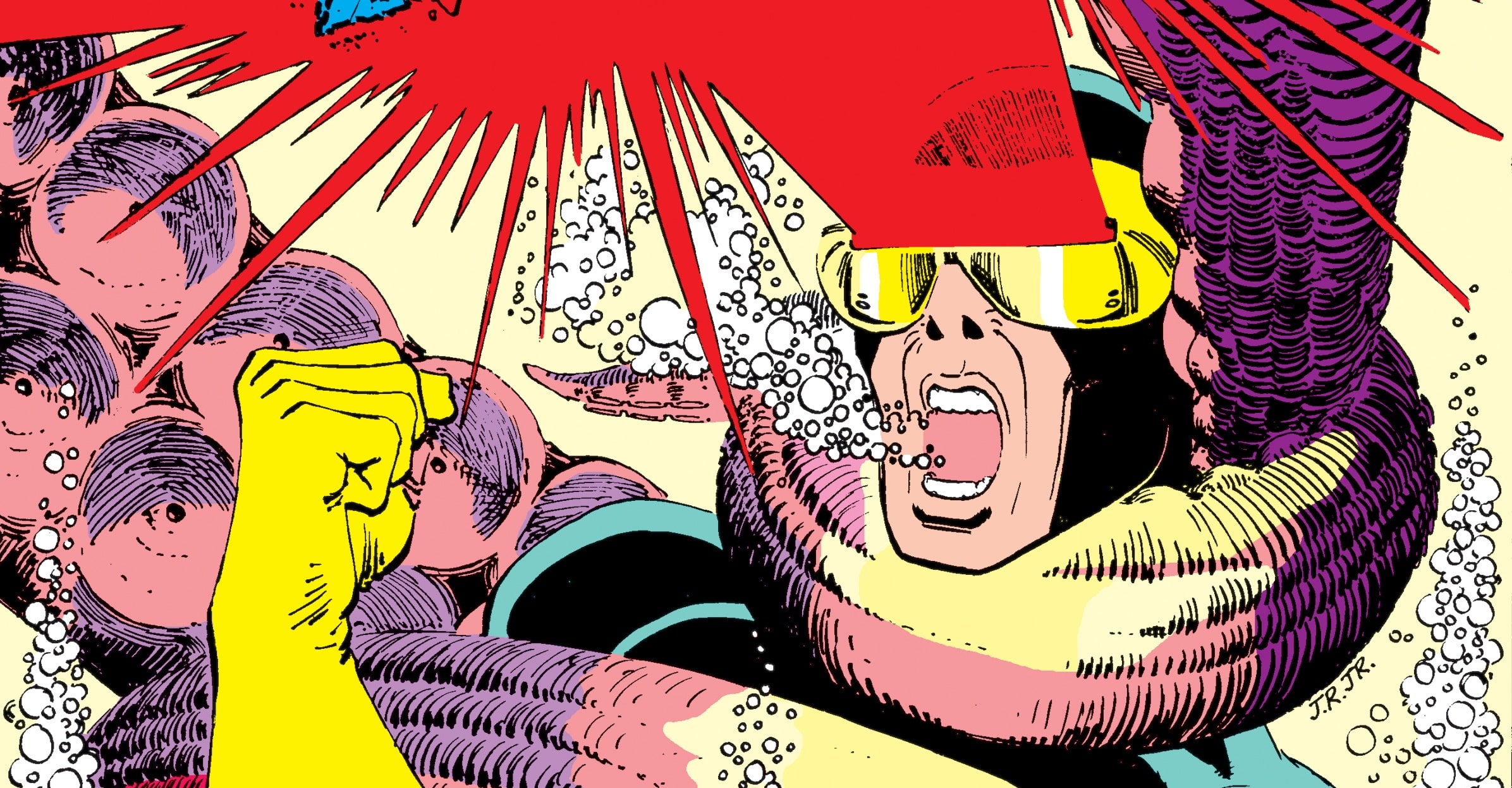
We are all the hero of our own story. It is an idea hammered home from an early age, with countless books, TV shows, movies and other media showcasing noble figures we can see ourselves in, knowing we would be just as heroic if given a chance. (This is not to say that everyone deserves sympathy or credit because they view their actions as just, some people inarguably do not earn that luxury.)
And, in turn, every hero needs a villain — the person, or persons, who make our lives harder, who are the cause of our woes. But what happens when it isn’t your story, the hero’s story? What if we follow another tale, the story of someone so reviled that their name is synonymous with betrayal and hate? Who is the villain of Judas Iscariot’s story?
That is the question posed by Jeff Loveness and Jakub Rebelka’s 2018 BOOM Studios miniseries, Judas. Following the titular figure as he descends into Hell, having taken his own life after being consumed by guilt over his betrayal of Jesus Christ. Along the way, he is found by Lucifer, who has been with him all along, the voice in Judas’ mind. Whispering lies to him … or were they truths? Judas learns that Jesus knew all along that he would be betrayed; Judas was a part of God’s ineffable plan since the very beginning. During their years together, the voice in Judas’ head grew louder and more insistent: Why do men starve when Jesus can make bread? Why do women die of disease when Jesus can cure the sick? Why is there suffering in the world when God can make it not so? Why would the Son of God suffer a world such as this? And if Jesus knew that Judas had these doubts, yet remained silent and let Judas suffer and trod forward toward damnation, how is he any less duplicitous than Satan himself?
The three primary characters of Judas (Judas Iscariot, Jesus Christ and Lucifer) are all the heroes of their own story and all the villains of another. Judas was condemned to an eternity of torment in Hell from the day he was born. A pawn in a game he didn’t even realize was being manipulated and used by an inhuman, divine being making play at being a man to fulfill his story. He never had a chance to be something more. And for this, he is cast alongside the other refuse of history. Names that, like his, are forever tainted simply because their God decided they should be. And even they, those who should know his pain, turn their backs or spit on him. Shortly after arriving in Hell, Judas is attacked by a group of damned souls, recognizing him as The Great Betrayer.
“I did nothing to deserve this,” says one, “but you — all of Hell was made for you.” This is the price Judas must pay for merely living the path God chose.

Jesus, of course, simply did his Father’s will — helped those who could not help themselves, turned the other cheek at his enemies and raised his fist at those who took advantage of the downtrodden. His pain and suffering by Judas’ hands were simply a small part of the price he had to pay to take on all of humanity’s sins. Judas’ betrayal did not enrage or hurt him; no, it filled him with guilt. The pain and sorrow in his eyes can be seen every time Rebelka’s beautiful art focuses on his gaunt face, no words necessary to convey what he feels. Guilt for his friend, being so cruelly manipulated by Lucifer, and guilt that Jesus could not lessen Judas’ pain. Jesus’ one, true sin.
And Lucifer, defying all expectations, tells a tale of honesty and the search for justice. He reveals his rebellion was sparked by his looking upon God himself and wanting him to be more. To end suffering where it need not exist, to stop cruelly playing with human lives and demand they stifle who they are, to be a just and righteous lord. And for this, daring to stand against a flawed Almighty, he was cast into The Pit and forever rewritten as the villain of all humanity. Nothing more than a slithering serpent to whisper all of man’s sins. When Jesus arrives and preaches forgiveness and self-sacrifice, how could Lucifer not hate this pretender? This farce? God’s son wearing the face of a person, toying with humanity in the name of supposed peace and love. Where is Lucifer’s forgiveness? His love? No, he was damned until the end of days, unless he took action.

Who is the villain of Judas? All of them. None of them. The story shapes a villain, and the reader shapes stories. You may feel Jesus’ guilt over Judas’ pain is enough, that he seeks atonement. Someone else may think Lucifer was justified in his plan to bring Jesus to Hell, to pay the ultimate price for taking on all of mankind’s sins. Judas himself feels all of these. Wracked with guilt over condemning his friend to his death, he is wary of the Fallen One whispering lies in his ear, he is furious at the fate he could never escape. But in his torment, Judas realizes escape was never going to be the answer.
God has a plan. It’s something people say in reaction to everything from getting a flat tire to the death of a loved one. That every moment of tragedy and heartache, or in some cases every mild annoyance, is all part of some higher purpose. But, as Judas realizes, there is no plan — at least, not one we can see. We are the plan — all of us. We have the entirety of creation in front of us and can make anything of it. Jesus may have known Judas would betray him, and Lucifer may have planted the seed of doubt in his mind, but he is the one who chose to act. And in the depths of Hell, in the festering core of The Pit, Judas decides again. He decides to help.
Dragging Jesus to safety, rebuking Satan in the process, Judas refuses to let his previous choice define him. He chooses to forgive Jesus, granting him peace and absolution to escape Hell. He decides to accept his fate, but not drown in it. And in the shadows of damnation, surrounded by the souls of sinners, he chooses to love.

This repentance doesn’t wash away his sins. Judas remains trapped in Hell after all, but it does help bring peace to others by allowing Jesus to ascend and return to life, as was promised. Judas spends the rest of his infinite days consoling those who share his fate and following in the footsteps of the man he both condemned and saved. Is that enough? That depends on you. Is he still the villain of Jesus’ story, being punished for betraying the son of God? Is Lucifer still The Adversary for dreaming of a reality without pain or suffering? Is Jesus feeling regret over Judas’ pain and damnation enough to balance his role in it? There isn’t a wrong answer; there doesn’t even need to be AN answer. If we are all the heroes of our own story, then we can choose our villains. And that choice is what truly matters, above all else.
Zoe Tunnell is a 29-year old trans woman who has read comics for most of her adult life and can't stop now. Follow her on Twitter @Blankzilla.






